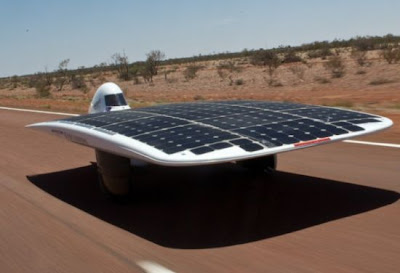
Recently New South Wales a student has introduces its new zero-emission electronic eco car is called a sunswift ivy solar powered car which is comes with world fastest solar-powered vehicle (speed of 88.738kph). Prior we have been lots of electronic eco cars but this zero-emission electronic car is superb from design and functionality.
 The sunswift ivy solar powered car is a type of 3 wheeled vehicles built in monocoque carbon fiber body. We will provide you elegant and smart features such as a CSIRO 3 phase DC 1800W electric motor, lithium-ion polymer battery pack, milestone car, and powered by silicon solar cells. Do you want more information about zero-emission electronic eco car then find out environmentindia.blogspot.com. [more]
The sunswift ivy solar powered car is a type of 3 wheeled vehicles built in monocoque carbon fiber body. We will provide you elegant and smart features such as a CSIRO 3 phase DC 1800W electric motor, lithium-ion polymer battery pack, milestone car, and powered by silicon solar cells. Do you want more information about zero-emission electronic eco car then find out environmentindia.blogspot.com. [more]















1 comments:
Low emission vehicles are expected to witness good growth as they are being accepted across the globe. Currently, low emission market is dominated by Full Hybrid Electric Vehicles (FHEVs) and expected to remain as market leader during the forecasted period. The market of North America is expected to be the biggest one for FHEVs. However, our research says that market for PHEVs and BEVs will develop at a faster rate due to governments’ initiatives to develop charging infrastructure in battery technology. The governments of Europe and China are promoting BEVs due to presence of competitive advantages over the other countries. China can shift to electric vehicle propulsion technology faster than its counterparts due to its ability to heavily invest in its development. Europe is already well equipped when it comes to charging infrastructure for EVs.
The most widely used batteries for Zero Emission Vehicle Report are lead-acid batteries, Nickel-Cadmium batteries (NiCad), metal hydride batteries (NimH), and lithium ion batteries. Till date, the mass produced FHEV cars have been powered by nickel metal-hydride (NiMH) batteries. However, there are certain noticeable rapid shifts in consumption pattern of batteries used for HEVs. Due to high energy density of lithium ion battery, loads of FHEV manufacturers such as Honda Motors (Japan) and Ford Motors (Germany) will be switching over to the lithium ion battery for FHEV. As an outcome, lithium ion battery is expected to capture the lion’s share in automotive battery market by 2017.
Post a Comment